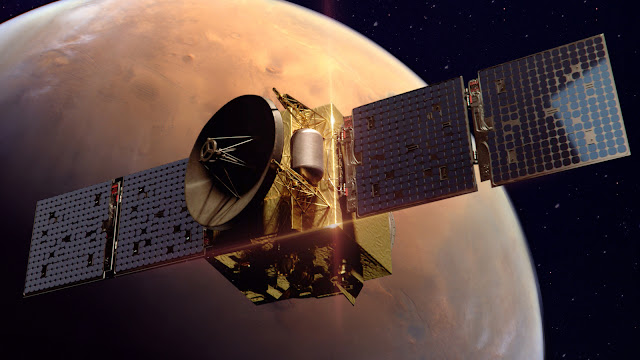NASA And UAE To Collaborate On Mars Missions - Why That's Important
When the United Arab Emirates (UAE) released the Hope spacecraft in 2020, it have become the primary task to Mars via way of means of an Arab nation, and it joined Mars missions via way of means of different nations which include the U.S., Russia, China, and Europe. Now, of these Mars orbiters could be teaming as much as percentage records, way to an settlement to percentage findings among NASA`s Mars Atmosphere and Volatile Evolution (MAVEN) orbiter and the Emirates Mars Mission's (EMM) Hope orbiter.
The Emirates Mars Mission released the Hope orbiter to Mars withinside the summer time season of 2020. Hope arrived on the pink planet in February 2021, and due to the fact that then it's been amassing records on Mars' ecosystem and climate systems. Hope has a bonus on this as it sits in an exceedingly excessive orbit, among 12,000 miles and 27,000 miles from the surface, which shall we it see big regions of the planet at once, in accordance to Inverse.
This method Hope has been capable of music big-scale climate activities like a dirt typhoon that rolled throughout the planet in January 2022, which include passing over the Jezero crater in which the NASA Perseverance rover and the Ingenuity helicopter are exploring.
By teaming up with NASA's MAVEN, which has been orbiting round Mars due to the fact that 2014, the 2 tasks can pool their records at the Martian ecosystem, and the top ecosystem in particular.
"MAVEN and EMM are every exploring unique elements of the Martian ecosystem and top-ecosystem system," stated MAVEN's lead investigator, Shannon Curry of the University of California, Berkeley (thru NASA). "Combined, we are able to have a far higher know-how of the coupling among the 2, and the impact of the decrease ecosystem at the break out to area of fueloline from the top ecosystem."
Open questions on Mars' ecosystem
Researchers understand that Mars has a completely skinny ecosystem, at simply 1% the density of the ecosystem on Earth, and that they understand it's far dropping this ecosystem over the years as well, way to preceding records accumulated via way of means of MAVEN (thru NASA). This technique has been ongoing for tens of thousands and thousands of years, that is one purpose that Mars' ecosystem is so skinny now.
However, there are nevertheless many questions on how this technique, referred to as atmospheric loss, keeps to have an effect on the planet. Some of those troubles had been laid out via way of means of a NASA organization referred to as MEPAG, or the Mars Exploration Program Analysis Group. By operating collectively with the Hope task, NASA scientists can research extra approximately this issue.
"EMM technology enhances MAVEN and the Hope probe become designed to reply clinical targets aligned immediately with MEPAG goals," stated Omran Sharaf, Project Director of the Emirates Mars Mission, in a statement. "Its observations have been usually designed to offer new insights that were not viable from beyond Mars missions. Now, via way of means of combining the 2 datasets from the EMM and MAVEN missions and analysing the effects collectively, we will construct a effective reaction to many essential questions we've approximately Mars and the evolution and dynamics of its ecosystem."







No comments